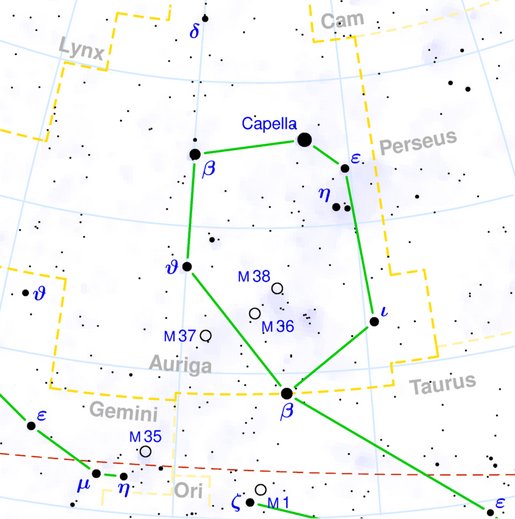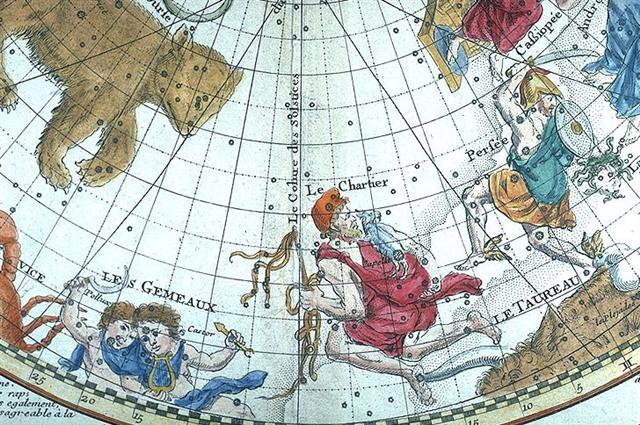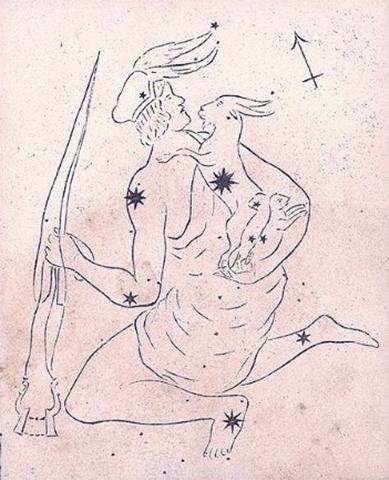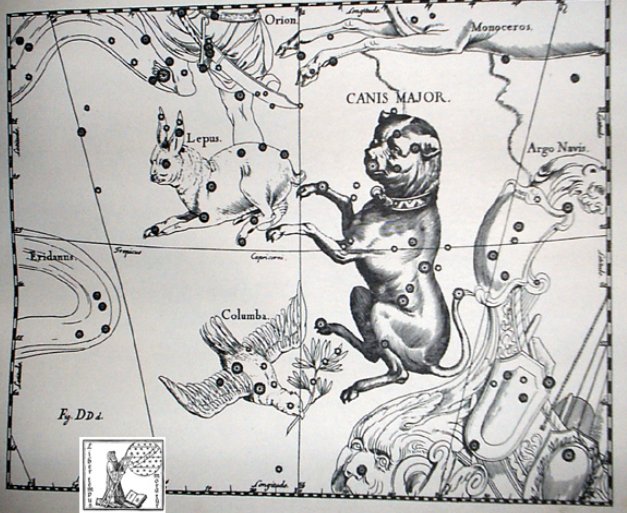21. The fully grown Rakau (Tree) was Sirius, the brightest of the stars in the night, although Capella (α in Auriga) was also very luminous:
... The tradition preserved by Hyginus in his Poetic Astronomy that the constellation Capricorn ('He-goat') was Zeus's foster-brother Aegipan, the Kid of the Goat Amalthea whose horn Zeus also placed among the stars, shows that Zeus was born at mid-winter when the Sun entered the house of Capricorn ...
Capella was in the same right ascension day as Rigel (also very bright): ... In view of the almost universal prevalence of the Pleiades year throughout the Polynesian area it is surprising to find that in the South Island and certain parts of the North Island of New Zealand and in the neighboring Chatham Islands, the year began with the new Moon after the early morning rising, not of the Pleiades, but of the star Rigel in Orion ...
A vertical line could be drawn down from the little star at the head of the Charioteer, viz. Praja-pāti (Lord of Created Beings, δ), to Menkalinan (Shoulder of the Rein-holder, β), and Mahashim (θ, Wrist - sic!) - i.e. they were rising at the same right ascension time - with π Aurigae (the tiny star just above Menkalinan) only a fraction of a day later. Further down was the Pigeon of Noah - waving her leaves - with η Columbae, the star at her right eye, also rising at the right ascension line defined by the Lord of Created Beings:
... Now Maui had already performed some of his magic for them on the night when they first set eyes on him, in the meeting house. On that occasion, in front of all his relatives, he had transformed himself into all kinds of birds that live in the forest. None of the shapes he assumed had pleased them particularly then, but now he turned himself into a kereru, or wood pigeon, and with this they were delighted. 'Heavens!' they said. 'You do look handsome. Much more beautiful than the birds you showed us last time.' What made him look so splendid now was that he was wearing the belt and skirt he had stolen from his mother that morning. The thing that looked so white across the pigeon's breast was his mother's belt. He also had the sheen of her skirt, that was made of burnished hair from the tail of a dog, and it was the fastening of her belt that made the beautiful feathers at his throat. This is how the wood pigeon got its handsome looks. Maui now perched on the branch of a tree near his brothers, and there, just like a real kereru, he sat quite still in one place. He did not hop from bough to bough like other birds, but sat there cooing to himself. Which made his brothers coin our proverb, 'The stupid pigeon sits on one bough and does not hop from place to place.' And they went away, and left him to change his shape again.
Next
morning Maui prepared to set off in search of his
parents. Before he left, he astonished his older
brothers once again by making quite a speech. 'Now
you stay here,' said little Maui, 'and you'll be
hearing something of me after I am gone. It is
because I love my parents so much that I am going
off to look for them. Listen to me, and say whether
the things I have been doing are remarkable or not.
Changing into birds can only be done by someone who
is skilled in magic, yet here I am, younger than all
of you, and I have turned myself into all the birds
of the forest, and now I am going to take the risk
of growing old and losing my powers because of the
great length of the journey to the place where I am
going.'
'That
might be so,' said his brothers, 'if you were going
on some warlike expedition. But in fact you are only
going to look for those parents whom we all love,
and if you ever find them we shall all be happy. Our
present sadness will be a thing of the past, and we
shall spend our lives between this place and theirs,
paying them happy visits. What is there to be afraid
of?'
Little
Maui went on, very serious. 'It is certainly a very
good cause that leads me to undertake this journey,
and when I reach the place I am going to, if I find
everything agreeable, then I shall be pleased with
it, and if I find it disagreeable, then I shall be
disgusted with it.' The brothers kept straight
faces, and replied: 'What you say is exceedingly
true, Maui. Depart then, on your journey, with your
great knowledge and your skill in magic.' Then their
brother went a little way into the forest, and came
back in the shape of a pigeon once more, with his
sheeny back and his white breast and his bright red
eye. His brothers were charmed, and there was
nothing they could do but admire him, as he flew
away. Away flew Maui in his pigeon shape, with his
brothers admiring him as he went. But as soon as he
was out of sight he wheeled about, and flew to the
clump of rushes that marked the place where his
mother disappeared.
He came
down, in his noisy pigeon way, and strutted about
for a moment. Then he lifted the rushes. He flopped
into the hole and replaced the clump behind him, and
was gone. A few strokes of his wings took him to
that other country, and soon he saw some people
talking to one another on the grass beneath some
trees. They were manapau trees, a kind that
grows in that land and nowhere else.
Maui flew
down to the tops of the trees and, without being
noticed by any of the people, perched on a branch
that enabled him to see them. Almost at once he
recognized Taranga, sitting on the grass beside her
husband, a man who by his dress and demeanor was
plainly a chief. 'Aha,' he cooed to himself, 'there
are my father and my mother just below me.' And soon
he knew that he was not mistaken, for he heard their
names when other members of the party spoke to them.
He flopped down through the leaves and perched on
the branch of a
puriri
tree thad had some berries on it. He turned his head
this way and that, and tilted it on its side. Then
he pecked off one of the berries and gently dropped
it, and it hit his father's forehead.
'Was that
a bird, that dropped that berry?' one of the party
asked. But the father said No, it was only a berry
that fell by chance.
So
Maui picked some more berries, and this time he
threw them down quite hard, and they hit both the
father and the mother and actually hurt them a
little. Then everyone got up and walked round
peering into the branches of the tree. The pigeon
cooed, and everyone saw it. Some went away and
gathered stones, and all of them, chiefs and common
people alike, began throwing stones up into the
branches. They threw for a long time without hitting
the pigeon once, but then a stone that was thrown by
Maui's father struck him. It was Maui, of course,
who decided that it should, for unless he had wished
it, no stone could have struck him. It caught his
left leg, and down he fell, fluttering through the
branches to the ground. But when they ran to pick
the bird up, it had turned into the shape of a young
man ...
|
|||||||||||||||||||||||||||||||||||||||||||||||||||||||||||||||||||||||||||||||||||||||||||||||||||||||||||||||||||||||||||||||||||















